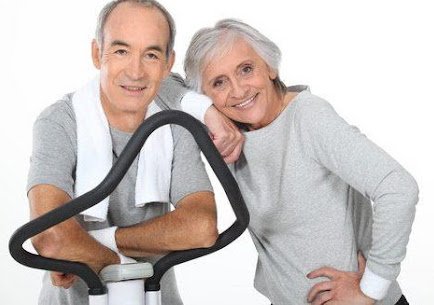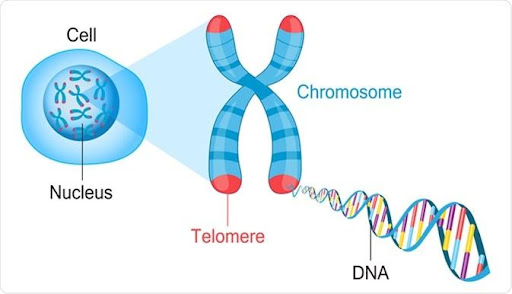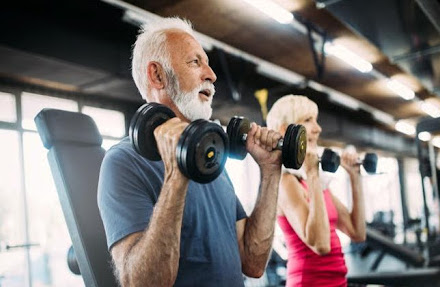 I'm going to start this email right off the bat with the reasons why physical activity helps you live better and longer:
I'm going to start this email right off the bat with the reasons why physical activity helps you live better and longer:
- Physical activity makes you happier.
It reduces stress and its harmful effects. In particular, exercise releases certain hormones such as testosterone and growth hormone, as well as neurotransmitters (dopamine, serotonin, norepinephrine, etc.) that act on the nervous system and positively affect mood, sleep, and libido.
- Physical activity makes you stronger.
It improves all digestive functions, transit, digestive secretion, and also stimulates circulation, supports the cardiovascular system and strengthens the immune system, protecting from infections, as well as allergies and cancer.
- Physical activity helps maintain muscle tissue.
Age-related muscular atrophy is one of the main and obvious signs of aging. The loss of muscle tissue begins already at the age of 25-30 years. To maintain muscle, you need to eat protein foods and exercise. Between 1 and 2% of the muscle mass that we lose on average every year after age 40 can be restored in 3 weeks of training if we train 3-4 times a week.
- Physical activity improves bone density.
To keep bones strong, the body breaks down old bone tissue and replaces it with new. However, by about the age of 30, bone mass ceases to increase, and from the age of 40–50 it begins to gradually decrease. Exercise can help increase bone density early in life and prevent osteoporosis, a disease that weakens bones and increases the risk of fractures.
- Physical activity can lengthen telomeres.
 DNA researchers have discovered that inside our cells there are peculiar counters that measure the time of their life – telomeres. This is something like “protective caps” at the ends of DNA strands. In other words, telomeres protect the ends of chromosomes where our genetic heritage is written. Their length decreases with age, and this contributes to cell aging.
DNA researchers have discovered that inside our cells there are peculiar counters that measure the time of their life – telomeres. This is something like “protective caps” at the ends of DNA strands. In other words, telomeres protect the ends of chromosomes where our genetic heritage is written. Their length decreases with age, and this contributes to cell aging.
In the course of research, scientists have found that there is a relationship between the level of physical activity and telomere length: the higher the level, the longer the length.
- Physical activity improves cognitive function
Exercise is currently considered one of the most promising methods for improving cognitive abilities. Studies show that physical activity is associated with a reduced risk of dementia, including Alzheimer's disease.
What kind of activity to choose in order to slow down aging?
– Fitness, bodybuilding
 They increase muscle mass and therefore support joints better, burn calories efficiently and remove toxins. These shorter, more intense efforts have been shown to increase growth hormone levels, which normally decline with age. Weight training is one of the best ways to slow down the process of muscle weakening. This type of exercise will not only maintain muscle strength, but will also make everyday activities less difficult, as well as help reduce susceptibility to disease.
They increase muscle mass and therefore support joints better, burn calories efficiently and remove toxins. These shorter, more intense efforts have been shown to increase growth hormone levels, which normally decline with age. Weight training is one of the best ways to slow down the process of muscle weakening. This type of exercise will not only maintain muscle strength, but will also make everyday activities less difficult, as well as help reduce susceptibility to disease.
– Yoga, stretching, Pilates
They help support movement and improve posture. In addition, they have the benefit of simultaneously improving the physical and emotional state. Plus, they are suitable for all ages.
– Interval training
High intensity interval training alternates between periods of intense muscle effort and relative rest. In the fight against aging, it is important not only to lose the accumulated fat mass, but also to preserve the muscles that inevitably “melt” over the years. At the same time, it is important to maintain good cardiovascular health.
In addition, lighter activities such as cycling, jogging and swimming, combined with weight-bearing exercises, help maintain bone health and reduce the risk of fractures.
But don't do all the exercises at once. Of course, before starting training, you should consult your doctor.
Physical exercise affects the aging process, that's for sure. Exercise and discipline your body regularly – five times a week for at least 30 minutes a day. This is the best thing you can do to add years to your life.
